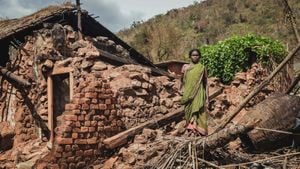Gathered under the looming shadow of climate change, nations from around the globe convened for COP29, held recently in Baku, Azerbaijan, but hopes for significant climate action were quickly dashed. Despite the urgency surrounding climate issues, the conference revealed deep divisions among states on how to effectively address fossil fuel emissions and finance climate mitigation.
Reports coming out of COP29 painted a disheartening picture. Experts expressed dismay at what they characterized as a "worrying setback" for global progress. Negotiators wrestled with contentious issues, attempting to expand upon last year’s landmark pledge to transition away from fossil fuels—a promise many countries didn't deliver on during these latest discussions. A proposed text meant to uphold this commitment was mysteriously diluted, reflecting the unresolved tension between fossil fuel dependency and the urgent need for action.
Laurence Tubiana, who played a pivotal role in crafting the 2015 Paris Agreement, was particularly vocal, stating, "The impacts of the climate crisis are becoming ever more visible, ever more devastating... the culprits are well known, yet once again fossil fuels have been defended by an ill-prepared COP presidency." Her comments underscored the frustration felt by many as COP discussions faltered, overshadowed by persistent fossil fuel interests.
The World Meteorological Organization (WMO) released alarming data just before the conference commenced, projecting 2024 to be one of the warmest years on record. According to the organization, global temperatures have surged about 1.54° Celsius above pre-industrial levels, underscoring the stark reality of climate warming which has now breached the Paris Agreement’s limit of 1.5° Celsius. Greenhouse gas concentrations—namely, carbon dioxide, methane, and nitrous oxide—have reached unprecedented levels, compounding worries about future climate stability.
Observers noted the involvement of key global players was minimal at COP29, exacerbated by the absence of leaders from major polluting countries such as the U.S. and China. This lack of participation contributed to the general sense of stagnation felt throughout the conference. With many powerful nations opting out, COP29 suffered from leadership voids at the very top level, raising questions about the commitment of wealthier nations to tackle the climate crisis effectively.
Against this backdrop, discussions over financing climate initiatives led to clashes among parties. A significant focus was the much-debated financial pact, which finally gained approval after prolonged negotiations but left many participants feeling shortchanged. While the agreement assigned funds exceeding $300 billion from wealthy nations toward climate initiatives, many voiced dissatisfaction, deeming this amount “insultingly low” relative to the scale of the challenge at hand.
A notable commentary came from Bahamian Prime Minister Philip Davis, who lamented how quickly funds are mobilized for military purposes over climate prevention, intensifying the spotlight on the imbalance between political will and environmental necessity. Such critiques pointed to not just moral failings but also practical obstacles preventing actionable climate frameworks and investments.
Umar Manzoor Shah, writing on the COP29 proceedings, remarked on Riad Meddeb's emphasis on the need for innovative solutions to climate finance, particularly for developing nations burdened by debt. He pointed to the necessity for sustainable financing mechanisms capable of attracting private investments to bolster climate action—essentially a call to shift the narrative from merely discussing climate finance to effectively deploying it.
The sentiments echo across many forums where environmental advocates insist developed nations bear the moral obligation to lead with actionable commitments, particularly as they grapple with their historical roles as major contributors to global emissions. The urgent need for these nations to step up and convert pledges made on paper to tangible actions couldn’t be clearer as COP29 Lauded opportunities for progress remained largely theoretical.
Another central theme echoed throughout COP29 was the significant challenge of transitioning toward net-zero emissions. The closing statements from many representatives reiterated the pressing target of achieving net-zero CO2 emissions by the late 2030s rather than the often-cited 2050 deadline, driving home the sense of immediacy surrounding climate discussions.
Despite the gloomy atmosphere, hope remains anchored within the knowledge of potential actions. The "Loss and Damage Fund" set up at COP28 was noted as a glimmer of progress, having already amassed around $700 million. Yet, participants recognized this was merely the beginning, needing developed countries to follow through with meaningful contributions to fulfill their obligations.
But even amid such challenges, some leaders have articulated bold visions for the future. Dr. Muhammad Yunus, during his remarks at COP29, called for engaging with the idea of "zero waste"—a principle aimed at minimizing resource consumption and fostering sustainable development practices. His advocacy for countries most affected by climate impacts not having to plead for help stands as both poignant and necessary, challenging the very framework of climate negotiations.
Yet, issues of fossil fuel reliance continued to dominate the discourse. Azerbaijan's President Ilham Aliyev stirred controversy by describing fossil fuels as "gifts of God," invoking strong reactions from various country representatives who argued his comments lessened the urgency of needed action.
The divide between fossil fuel-rich nations and developing countries striving to innovate eco-friendly alternatives became glaringly apparent as negotiations limped on under the weight of interests clashing. With potential global financial frameworks at stake, COP29 ended with promises of revisiting the matters at the next conference, scheduled for June of the following year.
While discussions and debates raged, the need for action could not have been clearer. Climate change persists not merely as an environmental issue but as one intricately woven through political, social, and economic lines global leaders must now navigate.
The icy reality, as reaffirmed by advocacy groups and health organizations at COP29, is the pressing need for concerted action, bridging healthcare with climate initiatives to solidly protect public health as the world teeters precariously at this crossroads. More than 100 organizations united under the Global Climate and Health Alliance pushed for commitments on funding for health-related climate initiatives, reinforcing the need for protective measures against the compounded effects of climate change.
COP29 elicited both frustration and determination among climate advocates as they sought to converge at the crossroads of science, policy, and activism. Despite the year's setbacks, there is still hope as renewed discussions surface for COP30. The tone may shift with the incoming U.S. administration aiming to reshape climate policies enacted by prior leaderships, but uncertainties linger about the direction of negotiation strategies—leaving observers wary as we inch closer to those pivotal climate thresholds.
With lessons learned from COP29, stakeholders are called to action. Climate mitigation isn't merely the jurisdiction of any single entity but rather collective responsibility demanding cooperative action across borders. While the path forward may remain fraught with obstacles, clarity about taking urgent steps forward lies at the heart of sustaining our planet's future.



